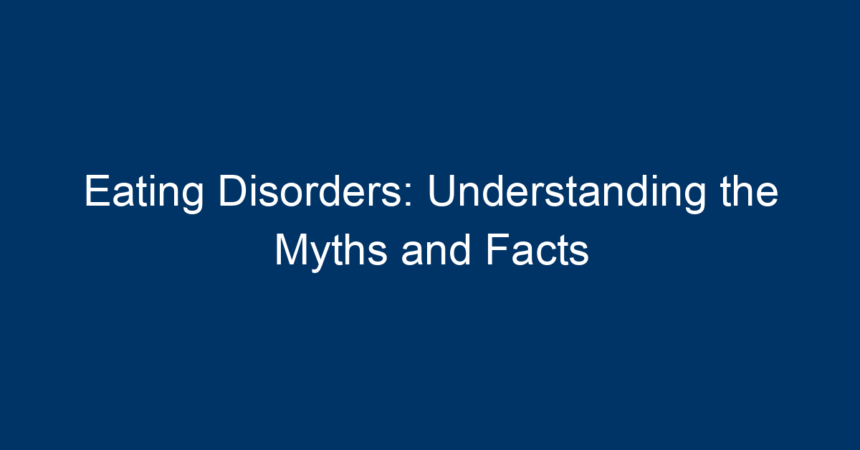Eating disorders are complex mental health conditions that affect millions of individuals worldwide. Amidst the prevalence of these issues, misconceptions and myths often cloud understanding and stigmatize those affected. This article will explore the various aspects of eating disorders, debunk common myths, and provide factual information to foster awareness and support.
What Are Eating Disorders?
Eating disorders encompass a range of psychological conditions that lead to unhealthy eating habits. They can manifest in various forms, including:
- Anorexia Nervosa
- Bulimia Nervosa
- Binge Eating Disorder
- Avoidant/Restrictive Food Intake Disorder (ARFID)
These disorders are not simply about food; they are intricate issues that can severely impact one’s physical and mental health. They stem from a combination of genetic, biological, environmental, and psychological factors.
Common Myths About Eating Disorders
Misunderstanding eating disorders can lead to harmful stereotypes and stigma. Let’s explore some prevalent myths and set the record straight.
Myth 1: Eating Disorders Are a Choice
One of the most damaging myths is that individuals with eating disorders choose their behaviors. In reality, eating disorders are complex mental health conditions often triggered by various factors, including trauma, stress, and societal pressures. Recovery is not simply a matter of willpower; it requires comprehensive treatment and support.
Myth 2: Only Young Women Are Affected
While it is true that eating disorders are often associated with young women, they can affect individuals of all genders, ages, and backgrounds. Increasing numbers of boys, men, older adults, and marginalized communities are experiencing these disorders. Understanding this fact can promote more inclusive support systems.
Myth 3: Eating Disorders Are About Vanity
Many believe that eating disorders are merely a desire to be thin or attractive. While societal standards of beauty can influence their development, underlying emotional issues, such as anxiety, depression, and a need for control, often play a more significant role. Eating disorders are not about appearance; they are deeply rooted psychological conditions.
Myth 4: People with Eating Disorders Are Always Underweight
While some eating disorders may lead to significant weight loss, this is not universally true. People with binge eating disorder, for example, may struggle with obesity, while those with anorexia might maintain a seemingly healthy weight. The focus should be on disordered eating behaviors rather than weight alone.
The Reality of Eating Disorders
Understanding the facts about eating disorders is essential in breaking down the stigma and effectively supporting those affected.
Statistics and Prevalence
According to the National Association of Anorexia Nervosa and Associated Disorders (ANAD):
- Approximately 30 million people in the U.S. will experience an eating disorder in their lifetime.
- Eating disorders have the highest mortality rate of any mental illness.
These statistics highlight the urgency for awareness and understanding around eating disorders.
Signs and Symptoms
Identifying eating disorders early can lead to better outcomes. Signs may include:
- Preoccupation with weight, food, and dieting
- Extreme changes in eating behaviors and habits
- Withdrawal from social activities and relationships
- Physical symptoms such as dizziness, fatigue, or irregular heartbeat
If you or someone you know exhibits these symptoms, seeking professional help is crucial.
Treatments and Recovery
Recovery from eating disorders is possible, but it involves a comprehensive approach that may include:
Professional Help
Engagement with medical professionals, such as therapists, dietitians, and physicians, is essential. Each person’s recovery is unique, and treatment plans should be personalized.
Therapy
Cognitive Behavioral Therapy (CBT) is often used to address the thought patterns associated with eating disorders. Other therapeutic approaches, such as Dialectical Behavior Therapy (DBT) or Family-Based Therapy (FBT), may also be beneficial.
Nutritional Counseling
Understanding nutrition and developing a healthy relationship with food is critical. Registered dietitians can facilitate this process by creating meal plans that promote balanced eating.
Support Systems
Building a network of support, whether through family, friends, or support groups, can greatly assist in recovery. Encouragement and understanding play pivotal roles in healing.
The Role of Society and Culture
Cultural and societal factors significantly influence eating disorders. The media’s portrayal of beauty standards can create unrealistic expectations, leading to body dissatisfaction.
Advocacy and Awareness
Increasing awareness and advocacy around body positivity and acceptance can help combat the stigma associated with eating disorders. Promoting realistic body images and celebrating diversity can foster supportive environments for those struggling.
Taking Action: How to Support Someone with an Eating Disorder
If you know someone affected by an eating disorder, there are constructive ways to offer support:
Educate Yourself
Understanding eating disorders is the first step to providing meaningful support. Resources from reputable organizations can provide valuable insights.
Approach with Compassion
When talking to someone with an eating disorder, approach them with empathy and without judgment. Offer to listen without pressuring them to open up.
Encourage Professional Help
If someone confides in you about their struggles, gently encourage them to seek help from professionals. You can offer assistance in finding resources or attending appointments.
Avoid Focusing on Weight
Focus on health rather than weight. Language matters; ensure conversations are free from assumptions based on appearance or eating habits.
Conclusion: Breaking the Stigma
Eating disorders are serious mental health conditions that require understanding and compassion. By debunking myths and spreading factual information, we can create a supportive environment for those affected.
Actionable Insights:
-
Educate Yourself and Others: Share accurate information about eating disorders within your community.
-
Be an Ally: Stand against stigma and support initiatives that promote body positivity and mental health awareness.
- Facilitate Open Conversations: Encourage healthy dialogues around food and body image to cultivate a more accepting atmosphere.
Together, we can help change the narrative around eating disorders and foster healing and recovery. Let’s work towards not only understanding these conditions better but also creating an inclusive world for everyone to thrive.




